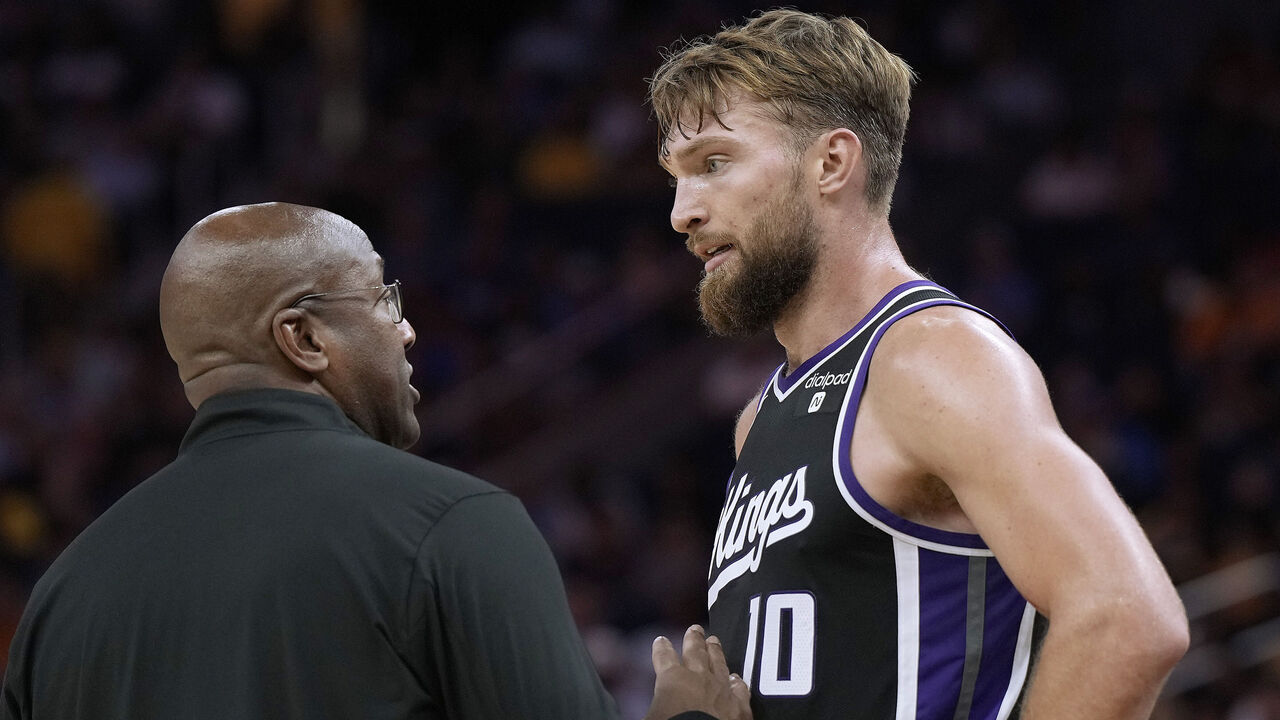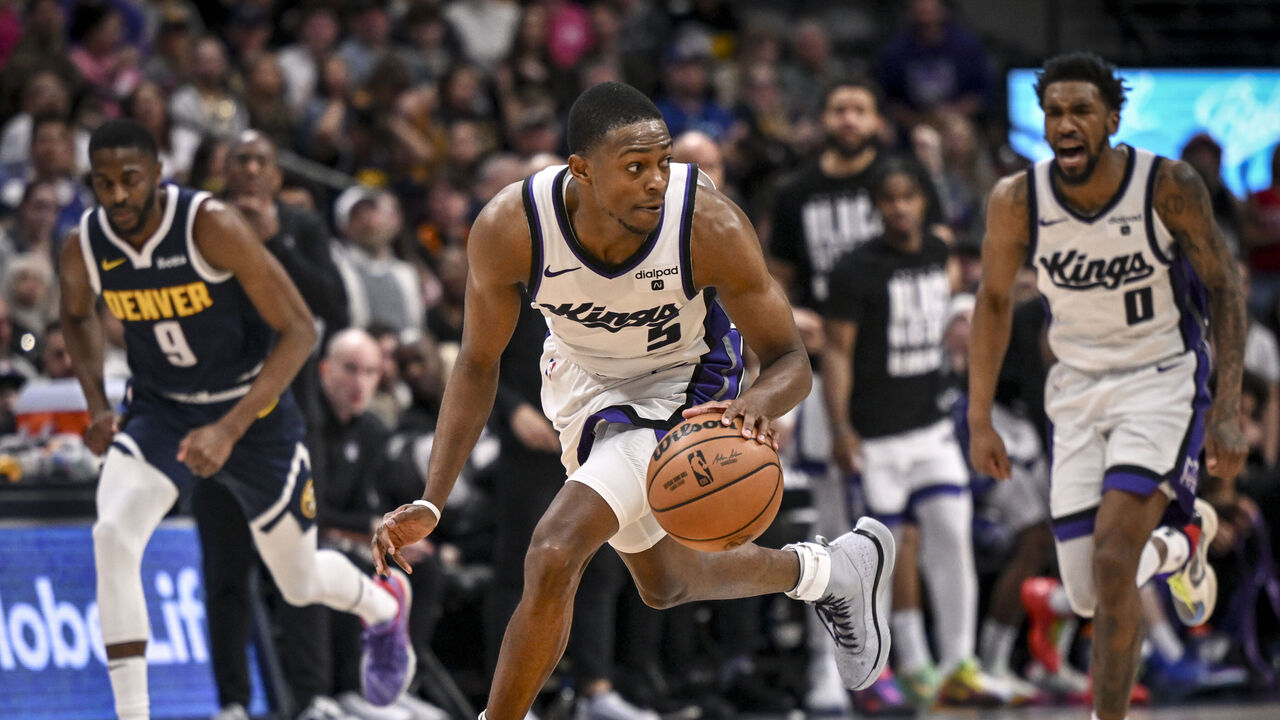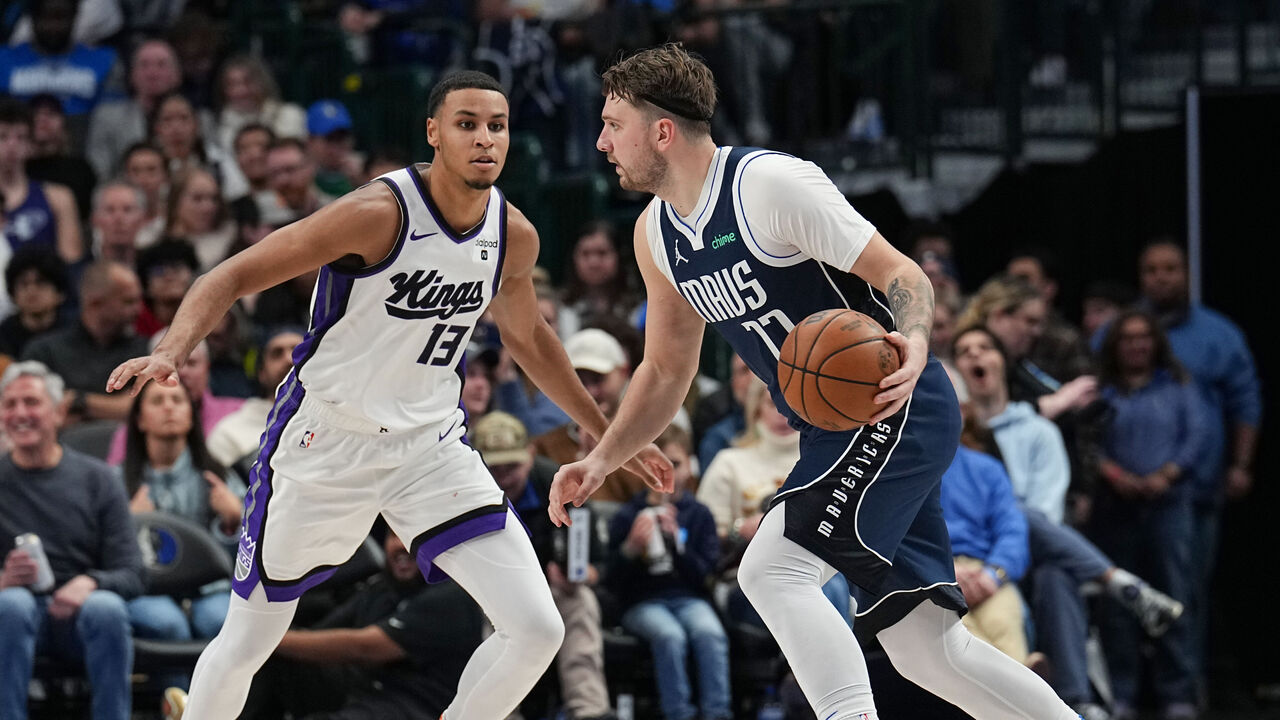What does uneven season say about Kings' trajectory?
When you finally reach the oasis of the postseason after 17 straight years wandering the desert, what do you do for an encore?
That was no token playoff appearance, either. Last year's Sacramento Kings authored the most efficient offense in NBA history, racked up 48 wins, snagged the Western Conference's No. 3 seed, and went toe-to-toe with the defending champs for seven games before succumbing to a volcanic Steph Curry.
De'Aaron Fox and Domantas Sabonis, the twin engines powering the team's ascent, were rewarded with All-NBA nods. Fox won the league's inaugural Clutch Player of the Year award. Mike Brown, who arrived from the Warriors' bench and imported many of their offensive principles, was named Coach of the Year. The whole season was one big celebration.
But the Kings are arguably facing an even bigger challenge this season than they overcame a year ago. They're trying to build on their galvanizing breakthrough under the weight of heftier expectations in a much more daunting West against competition less liable to be caught flat-footed by their rip-roaring pace and free-flowing motion offense.
In the crucible of that challenge, Sacramento is 34-25, just a game out of fifth in the West, which would've been a minor miracle in basically any other season over the last two decades. By positioning themselves to return to the playoffs, the Kings are ostensibly validating what they did last year and establishing a foundation of sustained success. So why does it all feel so ho-hum by comparison? Is it just about the lack of novelty? Or is it unease about the underlying wobbles lurking beneath the sturdy-looking facade?

On the plus side, the Kings' two-man nucleus is pulsating at about the same frequency as last season. Fox isn't finishing as effectively at the rim or hitting nearly as many of his long mid-rangers, but he's offset that by hitting a career-high 37% of his threes on almost eight attempts per game and playing the best defense of his career. Sabonis is leading the league in rebounding (13.2) for a second straight season while upping his assist average to 8.4 (good for fifth) and bashing and elbowing his way to 20 points a night on 65% true shooting.
And yet neither Fox nor Sabonis are All-Stars this year, let alone getting All-NBA consideration. Part of the reason for that has to do with the improved West. Part of it is the dwindling narrative momentum. But part of it is that, even in a vacuum, this campaign feels less persuasive than last.
The Kings' previously top-ranked offense has slid to 13th. They've improved on the other side of the ball (their defensive rating is nearly identical to last season's, which in the NBA's increasingly fertile offensive environment means they've jumped from 24th to 20th), but that still leaves them with a barely above water net rating of plus-0.3.
They're 8-5 against the West's vaunted top four but 0-6 against the Pelicans and Rockets, having also suffered losses to the dregs of the league in Detroit, Charlotte, and Portland. They thumped the Clippers early this week, then lost to a Heat team missing four starters the following night. A few nights later they went into Minnesota without Fox and handed the Timberwolves just their seventh home loss of the season. It felt like a microcosm of Sacramento's season, which can't be characterized as a disappointment (at least not yet) but has been decidedly uneven.
What can we attribute that unevenness to? And does it say anything about the Kings' long-term trajectory?
One thing that jumps out immediately is that their transition game doesn't have quite the same bite. They've fallen from third to 12th in transition frequency and from 14th to 21st in transition scoring efficiency, per Cleaning the Glass. The Kings' average time to shoot remains largely unchanged and still has them among the three fastest teams in the league. But not all early offense is created equal, and retreating defenses are covering off more of Sacramento's quick-hitting possessions.
The mere threat of the Kings' open-court attack still has its benefits. For example, it doesn't feel like an accident that they rank first in defensive rebound rate. They were a strong rebounding team last season, but opponents are that much more concerned about getting everybody back this campaign and are willing to punt the offensive glass to do so.

That would feel like an acceptable tradeoff if the Kings hadn't experienced an even steeper decline in the half court, where they're scoring four fewer points per 100 possessions. They're still getting up a ton of threes and have been slightly better from long-range than they were a season ago. But their rim frequency is way down (from 15th to 26th), and their free-throw attempt rate has cratered (from seventh to 28th). It feels like opponents are more dialed in on Sacramento's actions, switching weak-side exchanges and sitting on the backdoor cuts that tore apart so many defenses in 2022-23.
The Kings are even more handoff-oriented than they were last year, when they lapped the rest of the league in handoff frequency. In fact, at a rate of 42.9 per 100 possessions, they're averaging more handoffs than any team in recorded history, according to a source with access to Second Spectrum data. That revolves around the craftiness and tireless screen-setting prowess of Sabonis, who's forged prolific dribble-handoff partnerships with Fox, Kevin Huerter, Malik Monk, and, more recently, sophomore Keegan Murray.
The problem is that the Kings' scoring efficiency on those plays has dipped by about five points per 100, with Huerter seeing the biggest individual downturn. Switches have generally been far more effective at neutralizing their DHO actions, limiting the Kings to 0.83 points per possession. When opposing defenses can flatten the Kings out, it exposes their lack of real dribble-drive threats outside of Fox and Monk. (And even Fox is getting to the rim at a below-average rate for a point guard this season.) There just isn't a ton of athleticism on the wing, and none of Murray, Huerter, or Harrison Barnes has much downhill juice.
Those offensive cracks are concerning because this team, as constructed, isn't built to win with defense.
That said, it's worth noting the defensive strides the Kings have made, which could pay off if or when they rediscover their offensive mojo. They're hamstrung to a certain extent on that end by their personnel; pairing the lack of wing athleticism with an undersized center who struggles to protect the rim is a tough combo. But Sabonis does a solid job playing the show-and-recover game in pick-and-roll, and his teammates communicate and scramble behind him quite well.
So much comes down to the precision and timeliness of the Kings' low help and weak-side rotations. On that front, they're definitely better than last season. That's largely because Murray is one of the most improved defenders in the league, a leap manifested in excellent one-on-one defense and terrific work as a secondary rim-protector. He's gone from contesting 2.9 shots per game at the rim and allowing opponents to shoot 67.4% from there to contesting 3.6 per contest and holding opponents to 59.5%, according to NBA Advanced Stats.
Huerter, while nowhere near the deterrent Murray is, has also been much better as a low man this campaign. And while no one will ever confuse him for a rim-protector, the proactivity of his tags goes a long way. The upshot is the Kings have allowed the league's fifth-lowest rim frequency (down from 15th last year) and 14th-lowest rim field-goal percentage (down from 26th).
Meanwhile, Fox has been battling his tail off at the point of attack, building on what he did last season. He's physical, handsy, and has become very difficult to screen. He pressures the ball and stays active and engaged when defending away from it. Fox leads the league in deflections per game (3.6) and ranks second in steals (1.9).

It feels like the Kings are squeezing the most out of this group, even if their defensive shot profile disagrees. They have by far the biggest discrepancy in the league between their expected eFG% allowed based on shot location (fourth) and their actual eFG% allowed (26th), per Cleaning the Glass. Sacramento limits rim shots and gives up an average amount of threes, but the club's getting lit up at a league-high 40.5% clip from deep.
You can chalk a lot of that up to bad luck, especially because the Kings don't allow a particularly high number of uncontested threes. But the fact they had a similar issue with opponent shooting last season suggests that maybe something about their personnel has opposing teams feeling unbothered. Murray's defensive glow-up still leaves the Kings with only one credible wing defender, which is difficult because they also need Murray to do things like hound quick guards and insulate them with his weak-side help. It would be nice if Davion Mitchell could provide enough offensively to justify playing more than 13 minutes a game.
Take it all together, and we're watching an imperfect team try to work through its issues while the front office patiently assesses where to go from here. The good news is Sacramento has a strong foundation in place, with Brown at the helm and Murray profiling as an ideal wing to slot between Fox and Sabonis. For now, though, everything else feels up in the air.
Monk is an impending free agent, and the Kings may have difficulty retaining him because they're limited to Early Bird rights. Huerter taking a step back on offense makes his long-term fit feel more tenuous, given his limitations elsewhere. It's been clear for the last year and a half that upgrading on Barnes at the starting four should be a priority. (There's a reason this team was in the thick of the Pascal Siakam sweepstakes before he got moved to Indiana.)
It registered as a minor disappointment when the Kings effectively punted their potential cap space last summer, using their financial wiggle room to renegotiate and extend Sabonis' contract, ink Barnes to a questionable three-year extension, re-sign Trey Lyles, and bring Sasha Vezenkov over from Greece. It was also a bit frustrating to see the front office stand pat at the trade deadline rather than address obvious areas of weakness, particularly when GM Monte McNair came into the season touting the necessity of adding more two-way players to the roster.
At the same time, maybe the Kings never had a real chance to get any of the guys who would've made the most sense for them in free agency (Jerami Grant) or trade (Siakam, OG Anunoby). And shelling out meaningful assets to make a more marginal upgrade would've been a mistake. Their core is young (Sabonis is 27, Fox 26, Murray 23) and locked in for the foreseeable future, so it's perfectly fine for this season to be as much about information gathering and development as it is about improving on last year's first-round result. There's also something to be said for continuity, especially for a Kings franchise long defined by roster turnover, volatility on the bench, and impulsive front-office decision-making.
Eventually, though, they'll have to figure out how to take that next step and decide whether they can do so without a major personnel shakeup. This season has laid bare some limitations, but it hasn't made the answer to that question any clearer.
HEADLINES
- World Series odds: Where all 30 teams stand as spring training begins
- Suns' Ishbia rips tanking teams: 'Losing behavior done by losers'
- Bears' potential move to Indiana takes step forward
- Former manager Melvin returning to A's as special assistant
- Olympic semifinals preview: Storylines, players to watch, predictions